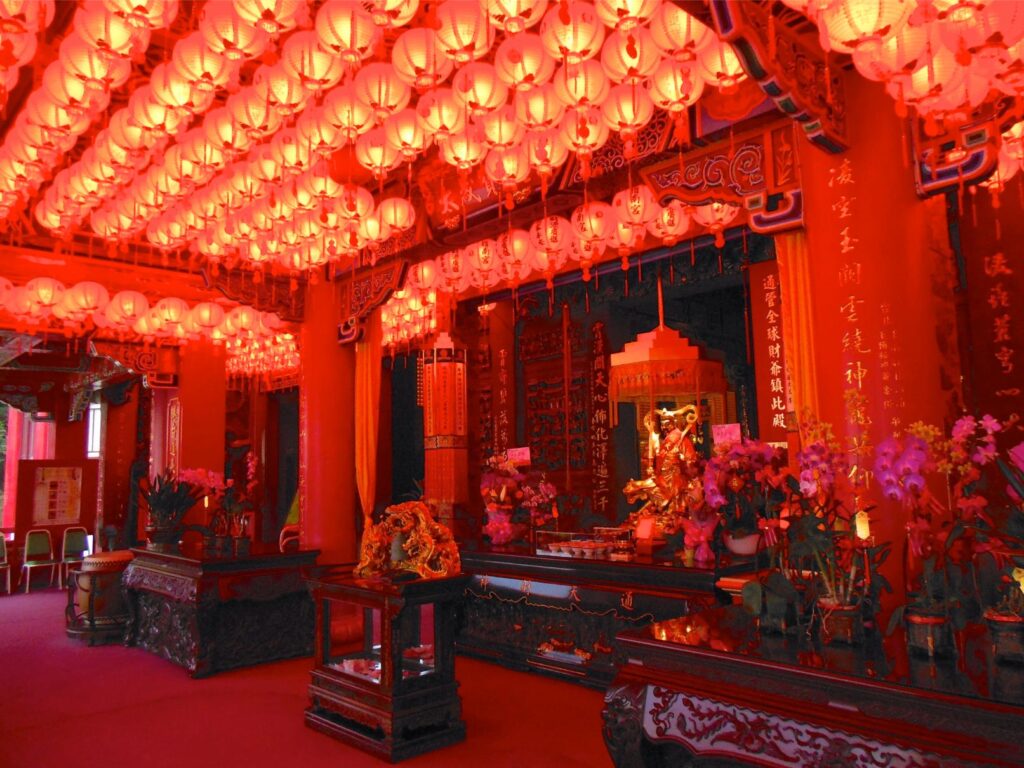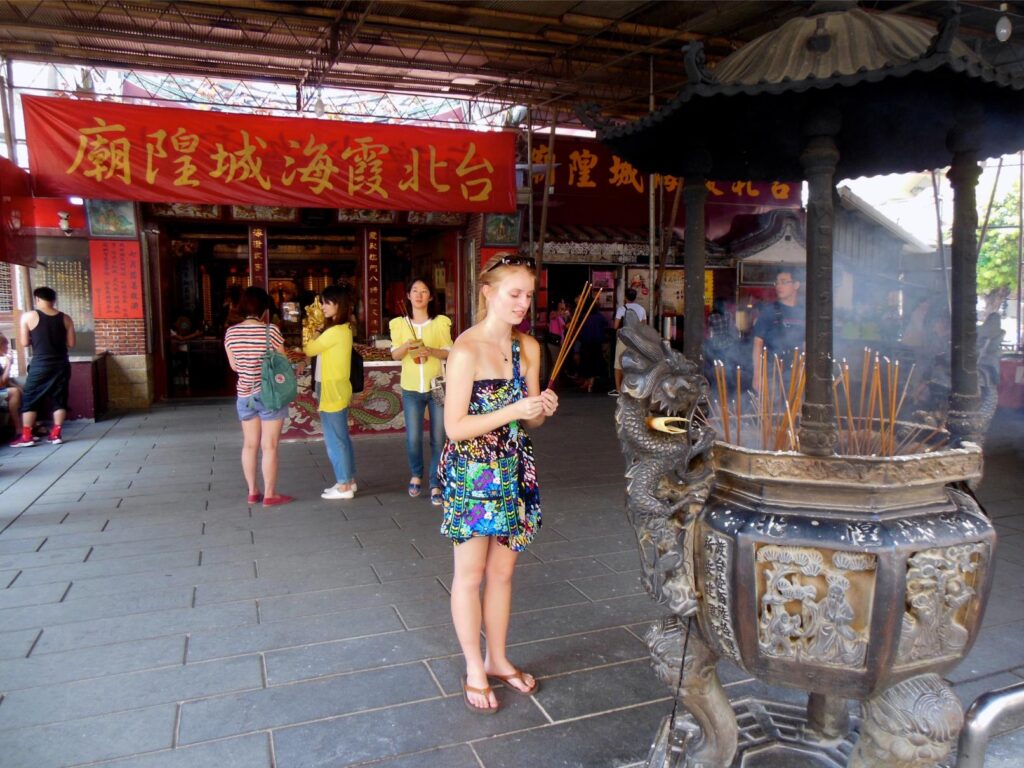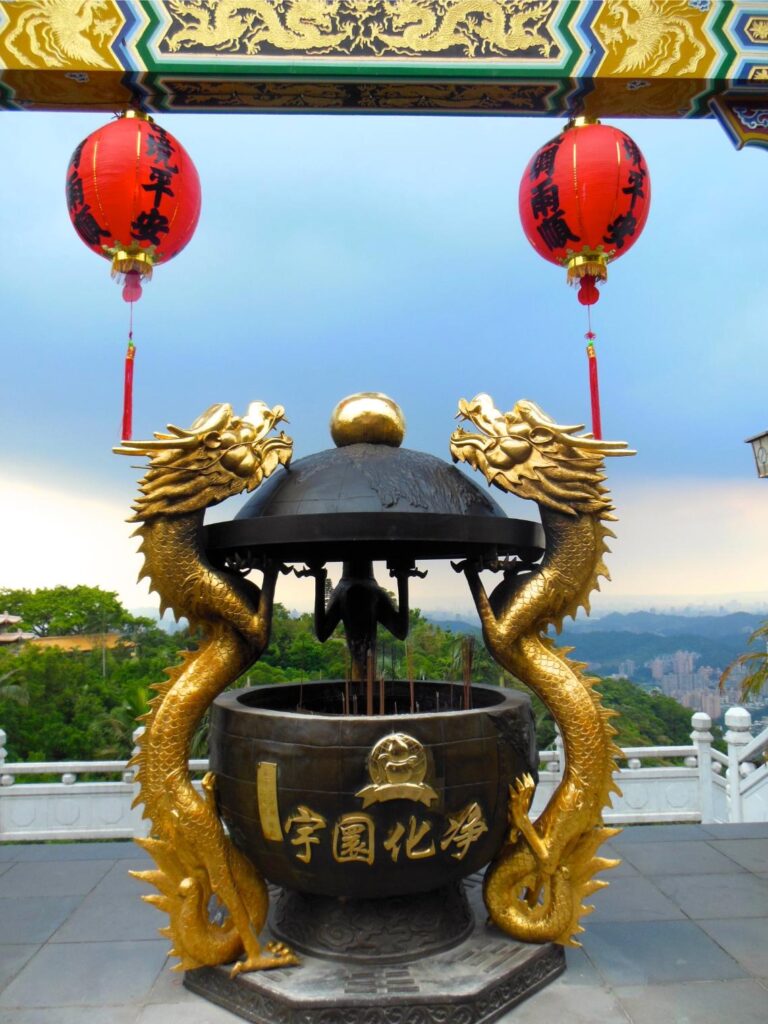Luck performs an enormous function in Chinese language tradition, so there are such a lot of methods to say “good luck” in Chinese language! After all, there’s the fundamental method to say it (I’ll introduce that first), however if you wish to sound like a local, that’s not all you should know!
Chinese language tradition is so wealthy in expressions, I’ll truly be introducing 34 expressions for all types of conditions! I’ll additionally give some nifty 成语 (chéngyǔ ), or four-character idioms that reveal lots about Chinese language tradition. And I can inform you, having studied Chinese language at college after which labored in Taiwan, these do come in useful!
And don’t fear when you’ve studied simplified or conventional characters – or when you’re nonetheless counting on pinyin since you’re undecided the way to learn Chinese language characters . I’ve acquired all of them included for each phrase!
Right here’s me about to make the ancestors an providing at a Chinese language cultural celebration at my workplace in Taiwan. (Apparently, they’re additionally followers of junk meals.) Let’s begin with some normal good luck phrases in Chinese language that you need to use in almost any form of scenario.
祝你好运 / 祝你好運 (zhù nǐ hǎo yùn )
加油 (jiā yóu )
我给你加油 / 我給你加油 (wǒ gěi nǐ jiā yóu )
祝你顺利 / 祝你順利 (zhù nǐ shùn lì )
These normal phrases present a stable basis for expressing good luck in Chinese language. Subsequent, let’s take a look at extra particular expressions tailor-made to completely different events and life occasions.
Okay, so let’s go deeper in our methods to want somebody luck in Chinese language. In Chinese language tradition, there are numerous expressions for well-wishing associated to research, work, well being, and extra!
Must want a scholar good luck in Chinese language? Listed below are some particular methods to do it!
好好儿考啊 / 好好兒考啊 (hǎo hǎor kǎo a )
祝你学业成功 / 祝你學業成功 (zhù nǐ xué yè chéng gōng )
祝你金榜题名 / 祝你金榜題名 (zhù nǐ jīn bǎng tí míng )chéngyǔ ) of this phrase actually means “Might your title be listed on the golden roster.” It’s a extra formal and conventional method to want somebody success of their exams, usually used for necessary assessments like faculty entrance exams.
Proper, so somebody you realize has completed finding out and is transferring on to work, and also you wish to want them good luck in Chinese language! Listed below are phrases you need to use with associates, colleagues, neighbors, or anybody else you realize working onerous!
好好儿干啊 / 好好兒幹啊 (hǎo hǎor gàn a )
祝你事业顺利 / 祝你事業順利 (zhù nǐ shì yè shùn lì )
祝你工作成功 (zhù nǐ gōng zuò chéng gōng )
马到成功 / 馬到成功 (mǎ dào chéng gōng )
步步高升 (bù bù gāo shēng )
After all, well being is one other side of life the place good luck is necessary in Chinese language! Right here’s the way to particularly want somebody good well being.
祝你身体健康 / 祝你身體健康 (zhù nǐ shēn tǐ jiàn kāng )
祝你长命百岁 / 祝你長命百歲 (zhù nǐ cháng mìng bǎi suì )
祝你福寿安康 / 祝你福壽安康 (zhù nǐ fú shòu ān kāng )
By the way in which, there are numerous extra methods to want somebody a contented new 12 months! Take a look at our particular article on wishing “Completely happy New Yr” in Chinese language , supplying you with a whopping 15 methods to do it!
Okay, so we’ve gone over the way to want somebody good luck in Chinese language for on a regular basis events. Now, let’s take a look at extra particular events! In Chinese language tradition, particular events name for particular well-wishes. Let’s discover some good luck expressions for weddings, birthdays, and different celebrations.
Right here’s me providing incense, hoping the gods smile down upon me in Taiwan. If you realize somebody getting married, you’ll positively wish to inform them nicely needs in Chinese language! Right here’s the way to do it for the joyful couple.
祝你们幸福 / 祝你們幸福 (zhù nǐ males xìng fú )
祝你们百年好合 / 祝你們百年好合 (zhù nǐ males bǎi nián hǎo hé )
白头偕老 / 白頭偕老 (bái tóu xié lǎo )
多子多孙 / 多子多孫 (duō zi duō sūn )
激情永在 (jī qíng yǒng zài )
早生贵子 / 早生貴子 (zǎo shēng guì zǐ )
Everybody has a birthday, so right here’s the way you categorical nicely needs in Chinese language year-round!
生日快乐 / 生日快樂 (shēng rì kuài lè )
祝你天天快乐,心想事成 / 祝你天天快樂,心想事成 (zhù nǐ tiān tiān kuài lè, xīn xiǎng shì chéng )
In Chinese language tradition, there are two new years, so listed here are two methods to ship somebody nicely needs in Chinese language for the daybreak of a brand new 12 months!
恭喜发财 / 恭喜發財 (gōng xǐ fā cái )
新年快乐 / 新年快樂 (xīn nián kuài lè )
In Chinese language tradition, wishing somebody luck usually consists of hopes for monetary success and prosperity, as we’ve seen in a number of the expressions above! These phrases are generally used throughout enterprise dealings, profession developments, or normal well-wishes for a affluent future.
Listed below are some common expressions, adopted by a brief dialogue about their appropriateness in numerous contexts.
祝你财源广进 / 祝你財源廣進 (zhù nǐ cái yuán guǎng jìn )
祝你财运亨通 / 祝你財運亨通 (zhù nǐ cái yùn hēng tōng )cái ) and luck (运/運 yùn ). So use this whenever you wish to want somebody not simply wealth, but in addition the nice fortune to handle it nicely.
祝你财源滚滚 / 祝你財源滾滾 (zhù nǐ cái yuán gǔn gǔn )gǔn gǔn ) offers a way of steady, rolling movement, suggesting an fixed influx of wealth. This vivid expression is ideal for wishing somebody ongoing monetary success.
These monetary good luck needs mirror the significance of prosperity in Chinese language tradition. They’re usually used throughout Chinese language New Yr, at enterprise openings, or when congratulating somebody on a brand new job or promotion. Whereas they give attention to materials wealth, they’re seen as optimistic needs for general well-being and success in life.
When utilizing these phrases, it’s necessary to think about the context and your relationship with the individual. In additional formal or enterprise settings, these needs for monetary prosperity are typically well-received. Nonetheless, in private relationships, you would possibly wish to stability these with needs for well being and happiness as nicely.
Keep in mind, in Chinese language tradition, speaking about cash and wishing for wealth isn’t thought-about taboo because it is likely to be in some Western cultures. These expressions are seen as real needs for an individual’s general success and well-being.
Along with situation-specific expressions, there are a number of versatile phrases in Chinese language that can be utilized to want somebody good luck or categorical good needs in varied contexts. Let’s discover a few of these:
一路顺风 / 一路順風 (yí lù shùn fēng )
保重 (bǎo zhòng )
寿比南山,福如东海 / 壽比南山,福如東海 (shòu bǐ nán shān, fú rú dōng hǎi )
Whereas Chinese language is wealthy in phrases, it’s additionally acquired a wealth of symbols for good luck! Listed below are just a few noteworthy examples:
Listed below are some normal fortunate indicators and symbols in Chinese language tradition.
Now that you simply’re conscious, you would possibly discover purple EVERYWHERE in Chinese language tradition! After all, there are numerous animals that symbolize good luck in Chinese language tradition, in addition to fortune, and extra! Listed below are a number of the most well-known examples.
龙 / 龍 (lóng ): Dragon, image of energy, energy, and luck. 凤凰 / 鳳凰 (fèng huáng ): Phoenix, represents advantage and charm. 虎 (hǔ ): Tiger, symbolizes energy and bravado. 蝙蝠 (biān fú ): Bat, its title sounds much like 福 (fú , “fortune”). (The Chinese language love puns!) 仙鹤 / 仙鶴 (xiān hè ): Crane, symbolizes longevity. 锦鲤 / 錦鯉 (jǐn lǐ ): Koi fish, represents perseverance and success. 金鲤鱼 / 金鯉魚 (jīn lǐ yú ): Golden carp, related to abundance and perseverance. 乌龟 / 烏龜 (wū guī ): Tortoise, symbolizes longevity and knowledge. You will have observed that most of the Chinese language good luck animals are members of the Chinese language zodiac , or 生肖 (shēng xiào )! That is Chinese language astrology. In case you’re much less acquainted, the animals are:
鼠 (“shǔ*, Rat) 牛 (niú , Ox) 虎 (hǔ , Tiger) 兔 (tù , Rabbit) 龙/龍 (lóng , Dragon) 蛇 (shé , Snake) 马/馬 (mǎ , Horse) 羊 (yáng , Goat) 猴 (hóu , Monkey) 鸡/雞 (jī , Rooster) 狗 (gǒu , Canine) 猪/豬 (zhū , Pig). In Chinese language tradition, whereas all zodiac animals have their very own traits and strengths, some are historically thought-about luckier than others. Right here’s an outline:
龙 / 龍 (lóng ) – Dragon:
虎 (hǔ ) – Tiger:
兔 (tù ) – Rabbit:
猪 / 豬 (zhū ) – Pig:
鼠 (shǔ ) – Rat:
(Sadly, my signal, the Rooster, doesn’t fall into the tremendous fortunate record.)
As a result of they’re so fortunate, dragons usually function at temples! It’s necessary to notice that based on the Chinese language zodiac, luck can range relying on the 12 months. Every zodiac animal’s luck can change primarily based on the present 12 months’s zodiac signal and different astrological elements.
The phrase for when your 12 months comes is 本命年 (běn mìng nián ). Opposite to what some would possibly count on, the 12 months of 1’s personal zodiac animal is historically thought-about a difficult 12 months, requiring additional warning relatively than being particularly fortunate.
Additionally, private beginning years matter. A person’s luck is commonly tied to their very own zodiac signal and its relationship with the present 12 months’s signal.
Likewise, compatibility performs a job. Some zodiac indicators are thought-about extra appropriate and thus “luckier” when paired collectively!
And do you know that cultural variations exist? Completely different areas inside China and different East Asian international locations could have barely completely different interpretations of which animals are luckiest.
Carefully associated to astrology and the zodiac, we’ve got Feng Shui (风水 / 風水, fēng shuǐ ). That is an historic Chinese language follow that goals to harmonize people with their surrounding atmosphere. It includes arranging residing and dealing areas to optimize the circulate of qi (气 / 氣, qì ), or life pressure vitality, primarily based on ideas of stability and the interplay of the 5 components (五行, wǔ xíng ). Practitioners imagine that correct Feng Shui can convey luck, well being, and prosperity, whereas poor feng shui can result in misfortune and misery.
Now, Feng Shui and Chinese language astrology are associated, however they’re distinct practices inside conventional Chinese language metaphysics. Right here’s a quick rationalization of their relationship.
Each Feng Shui and Chinese language astrology are primarily based on the identical elementary ideas of Chinese language philosophy, together with:
Yin and Yang (阴阳 / 陰陽, yīn yáng ) – The idea of stability between opposing forces. 5 Parts (五行, wǔ xíng ) – These are 木 (mù , Wooden), 火 (huǒ , Hearth), 土 (tǔ , Earth), 金 (jīn , Steel), and 水 (shuǐ , Water). Qi (气 / 氣, qì ) or life pressure vitality Feng Shui usually incorporates astrological components to find out auspicious dates, instructions, and placements. For instance:
However Feng Shui primarily offers with the association of bodily areas and objects
Whereas they’re separate disciplines, Feng Shui and Chinese language astrology are sometimes used collectively in conventional Chinese language practices to supply a complete strategy to harmonizing one’s life with the pure and cosmic forces believed to affect human affairs.
Now, let me clarify this idea in additional element.
In Chinese language feng shui, sure instructions are believed to be extra auspicious or fortunate for people primarily based on varied elements, together with:
Feng shui sometimes considers eight fundamental instructions:
Individuals would possibly use these fortunate instructions to find out:
Additionally, a person’s fortunate instructions are sometimes calculated primarily based on their beginning date utilizing the Ba Zhai (八宅 bā zhái ) system or different Feng Shui strategies.
Now, earlier than I wrap up, that can assist you additional perceive and use these good luck expressions in Chinese language, listed here are solutions to some frequent questions. Take into account this a recap of what we discovered right now!
Q1: How do you would like somebody luck in Chinese language?zhù nǐ hǎo yùn ), which immediately interprets to “want you good luck.” Nonetheless, Chinese language audio system usually want extra particular phrases tailor-made to the scenario, reminiscent of 加油 (jiā yóu ) for normal encouragement or 祝你成功 (zhù nǐ chéng gōng ) for wishing success.
Q2: What’s the Chinese language phrase for luck?fú ). This character is commonly seen in decorations, particularly throughout Chinese language New Yr. It’s utilized in phrases like 祝你福寿安康 (zhù nǐ fú shòu ān kāng ), wishing somebody luck, longevity, and well being.
Q3: The right way to pronounce these good luck phrases appropriately?
This fall: Are these phrases utilized in all Chinese language-speaking areas?
Q5: Is it acceptable to make use of elaborate good luck phrases in informal conversations?jiā yóu ) are sometimes extra acceptable. Extra elaborate phrases are sometimes reserved for formal events or when addressing elders.
Q6: Can I take advantage of these phrases in written communication, like emails or messages?
As we’ve explored on this complete information, there are quite a few methods to say “good luck” in Chinese language, every tailor-made to particular conditions or events. Some key factors to recollect:
By incorporating these phrases into your Chinese language language repertoire, you’ll not solely enhance your language abilities but in addition deepen your cultural understanding. Whether or not you’re a language learner, a enterprise skilled working with Chinese language colleagues, or just somebody fascinated by Chinese language tradition, these expressions will show you how to join extra meaningfully with native audio system.
So don’t hesitate to place these expressions into follow. With time and use, you’ll end up naturally integrating these good luck needs into your Chinese language conversations, spreading positivity and goodwill in a culturally resonant manner.
祝你学习进步,越来越棒!(zhù nǐ xué xí jìn bù, yuè lái yuè bàng! )
Translator, instructor, interpreter
Kelsey is a author, translator, and educator. She is an avid lover of dance, canines, and tea. LinkedIn | Contently
Speaks: English, Japanese, Spanish, Mandarin Chinese language, Swahili, Bengali
View all posts by Kelsey Lechner








